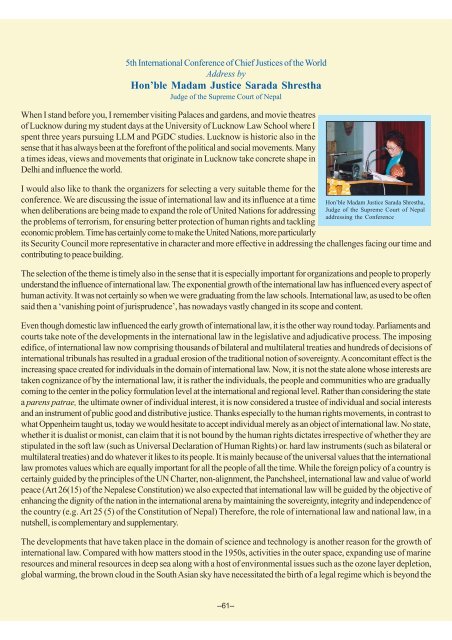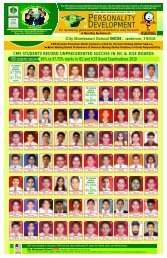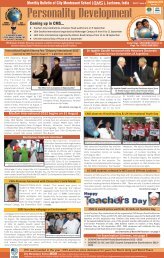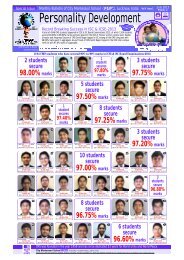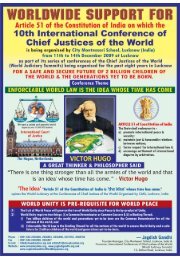Download the Speeches of all Hon'ble Chief Justices & Judges in ...
Download the Speeches of all Hon'ble Chief Justices & Judges in ...
Download the Speeches of all Hon'ble Chief Justices & Judges in ...
Create successful ePaper yourself
Turn your PDF publications into a flip-book with our unique Google optimized e-Paper software.
5th International Conference <strong>of</strong> <strong>Chief</strong> <strong>Justices</strong> <strong>of</strong> <strong>the</strong> WorldAddress byHon’ble Madam Justice Sarada ShresthaJudge <strong>of</strong> <strong>the</strong> Supreme Court <strong>of</strong> NepalWhen I stand before you, I remember visit<strong>in</strong>g Palaces and gardens, and movie <strong>the</strong>atres<strong>of</strong> Lucknow dur<strong>in</strong>g my student days at <strong>the</strong> University <strong>of</strong> Lucknow Law School where Ispent three years pursu<strong>in</strong>g LLM and PGDC studies. Lucknow is historic also <strong>in</strong> <strong>the</strong>sense that it has always been at <strong>the</strong> forefront <strong>of</strong> <strong>the</strong> political and social movements. Manya times ideas, views and movements that orig<strong>in</strong>ate <strong>in</strong> Lucknow take concrete shape <strong>in</strong>Delhi and <strong>in</strong>fluence <strong>the</strong> world.I would also like to thank <strong>the</strong> organizers for select<strong>in</strong>g a very suitable <strong>the</strong>me for <strong>the</strong>conference. We are discuss<strong>in</strong>g <strong>the</strong> issue <strong>of</strong> <strong>in</strong>ternational law and its <strong>in</strong>fluence at a timewhen deliberations are be<strong>in</strong>g made to expand <strong>the</strong> role <strong>of</strong> United Nations for address<strong>in</strong>g<strong>the</strong> problems <strong>of</strong> terrorism, for ensur<strong>in</strong>g better protection <strong>of</strong> human rights and tackl<strong>in</strong>geconomic problem. Time has certa<strong>in</strong>ly come to make <strong>the</strong> United Nations, more particularlyHon’ble Madam Justice Sarada Shrestha,Judge <strong>of</strong> <strong>the</strong> Supreme Court <strong>of</strong> Nepaladdress<strong>in</strong>g <strong>the</strong> Conferenceits Security Council more representative <strong>in</strong> character and more effective <strong>in</strong> address<strong>in</strong>g <strong>the</strong> ch<strong>all</strong>enges fac<strong>in</strong>g our time andcontribut<strong>in</strong>g to peace build<strong>in</strong>g.The selection <strong>of</strong> <strong>the</strong> <strong>the</strong>me is timely also <strong>in</strong> <strong>the</strong> sense that it is especi<strong>all</strong>y important for organizations and people to properlyunderstand <strong>the</strong> <strong>in</strong>fluence <strong>of</strong> <strong>in</strong>ternational law. The exponential growth <strong>of</strong> <strong>the</strong> <strong>in</strong>ternational law has <strong>in</strong>fluenced every aspect <strong>of</strong>human activity. It was not certa<strong>in</strong>ly so when we were graduat<strong>in</strong>g from <strong>the</strong> law schools. International law, as used to be <strong>of</strong>tensaid <strong>the</strong>n a ‘vanish<strong>in</strong>g po<strong>in</strong>t <strong>of</strong> jurisprudence’, has nowadays vastly changed <strong>in</strong> its scope and content.Even though domestic law <strong>in</strong>fluenced <strong>the</strong> early growth <strong>of</strong> <strong>in</strong>ternational law, it is <strong>the</strong> o<strong>the</strong>r way round today. Parliaments andcourts take note <strong>of</strong> <strong>the</strong> developments <strong>in</strong> <strong>the</strong> <strong>in</strong>ternational law <strong>in</strong> <strong>the</strong> legislative and adjudicative process. The impos<strong>in</strong>gedifice, <strong>of</strong> <strong>in</strong>ternational law now compris<strong>in</strong>g thousands <strong>of</strong> bilateral and multilateral treaties and hundreds <strong>of</strong> decisions <strong>of</strong><strong>in</strong>ternational tribunals has resulted <strong>in</strong> a gradual erosion <strong>of</strong> <strong>the</strong> traditional notion <strong>of</strong> sovereignty. A concomitant effect is <strong>the</strong><strong>in</strong>creas<strong>in</strong>g space created for <strong>in</strong>dividuals <strong>in</strong> <strong>the</strong> doma<strong>in</strong> <strong>of</strong> <strong>in</strong>ternational law. Now, it is not <strong>the</strong> state alone whose <strong>in</strong>terests aretaken cognizance <strong>of</strong> by <strong>the</strong> <strong>in</strong>ternational law, it is ra<strong>the</strong>r <strong>the</strong> <strong>in</strong>dividuals, <strong>the</strong> people and communities who are gradu<strong>all</strong>ycom<strong>in</strong>g to <strong>the</strong> center <strong>in</strong> <strong>the</strong> policy formulation level at <strong>the</strong> <strong>in</strong>ternational and regional level. Ra<strong>the</strong>r than consider<strong>in</strong>g <strong>the</strong> statea parens patrae, <strong>the</strong> ultimate owner <strong>of</strong> <strong>in</strong>dividual <strong>in</strong>terest, it is now considered a trustee <strong>of</strong> <strong>in</strong>dividual and social <strong>in</strong>terestsand an <strong>in</strong>strument <strong>of</strong> public good and distributive justice. Thanks especi<strong>all</strong>y to <strong>the</strong> human rights movements, <strong>in</strong> contrast towhat Oppenheim taught us, today we would hesitate to accept <strong>in</strong>dividual merely as an object <strong>of</strong> <strong>in</strong>ternational law. No state,whe<strong>the</strong>r it is dualist or monist, can claim that it is not bound by <strong>the</strong> human rights dictates irrespective <strong>of</strong> whe<strong>the</strong>r <strong>the</strong>y arestipulated <strong>in</strong> <strong>the</strong> s<strong>of</strong>t law (such as Universal Declaration <strong>of</strong> Human Rights) or. hard law <strong>in</strong>struments (such as bilateral ormultilateral treaties) and do whatever it likes to its people. It is ma<strong>in</strong>ly because <strong>of</strong> <strong>the</strong> universal values that <strong>the</strong> <strong>in</strong>ternation<strong>all</strong>aw promotes values which are equ<strong>all</strong>y important for <strong>all</strong> <strong>the</strong> people <strong>of</strong> <strong>all</strong> <strong>the</strong> time. While <strong>the</strong> foreign policy <strong>of</strong> a country iscerta<strong>in</strong>ly guided by <strong>the</strong> pr<strong>in</strong>ciples <strong>of</strong> <strong>the</strong> UN Charter, non-alignment, <strong>the</strong> Panchsheel, <strong>in</strong>ternational law and value <strong>of</strong> worldpeace (Art 26(15) <strong>of</strong> <strong>the</strong> Nepalese Constitution) we also expected that <strong>in</strong>ternational law will be guided by <strong>the</strong> objective <strong>of</strong>enhanc<strong>in</strong>g <strong>the</strong> dignity <strong>of</strong> <strong>the</strong> nation <strong>in</strong> <strong>the</strong> <strong>in</strong>ternational arena by ma<strong>in</strong>ta<strong>in</strong><strong>in</strong>g <strong>the</strong> sovereignty, <strong>in</strong>tegrity and <strong>in</strong>dependence <strong>of</strong><strong>the</strong> country (e.g. Art 25 (5) <strong>of</strong> <strong>the</strong> Constitution <strong>of</strong> Nepal) Therefore, <strong>the</strong> role <strong>of</strong> <strong>in</strong>ternational law and national law, <strong>in</strong> anutshell, is complementary and supplementary.The developments that have taken place <strong>in</strong> <strong>the</strong> doma<strong>in</strong> <strong>of</strong> science and technology is ano<strong>the</strong>r reason for <strong>the</strong> growth <strong>of</strong><strong>in</strong>ternational law. Compared with how matters stood <strong>in</strong> <strong>the</strong> 1950s, activities <strong>in</strong> <strong>the</strong> outer space, expand<strong>in</strong>g use <strong>of</strong> mar<strong>in</strong>eresources and m<strong>in</strong>eral resources <strong>in</strong> deep sea along with a host <strong>of</strong> environmental issues such as <strong>the</strong> ozone layer depletion,global warm<strong>in</strong>g, <strong>the</strong> brown cloud <strong>in</strong> <strong>the</strong> South Asian sky have necessitated <strong>the</strong> birth <strong>of</strong> a legal regime which is beyond <strong>the</strong>--61--


